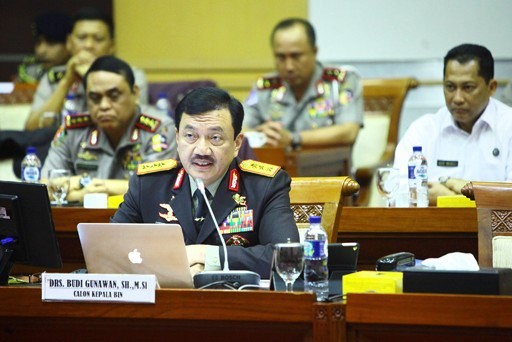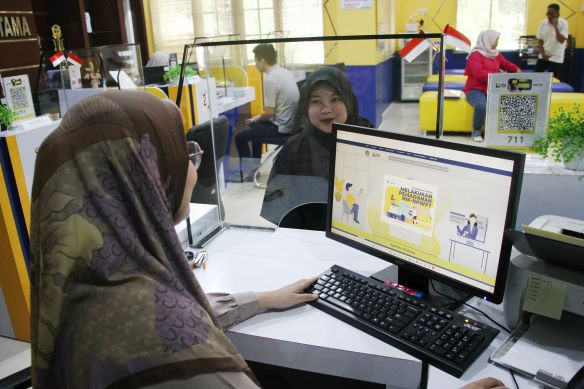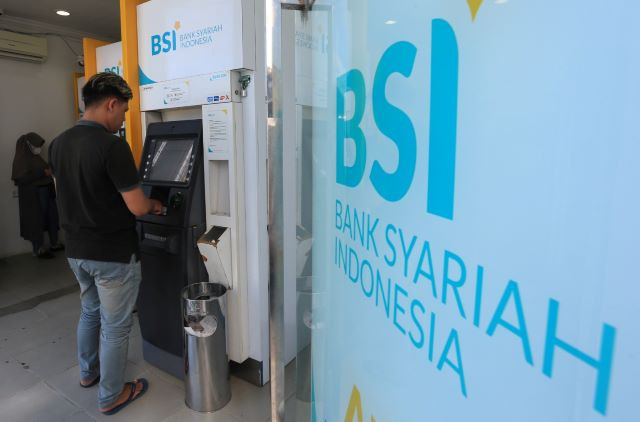Challenges ahead for new spy chief
Change Size
 Upbeat -- Comr. Gen. Budi Gunawan attends a screening test over his nomination to be the State Intelligence Agency's (BIN) new chief at the House of Representatives on Sept. 7. (JP/Seto Wardhana)
Upbeat -- Comr. Gen. Budi Gunawan attends a screening test over his nomination to be the State Intelligence Agency's (BIN) new chief at the House of Representatives on Sept. 7. (JP/Seto Wardhana)
T
he House of Representatives unanimously approved Thursday President Joko “Jokowi” Widodo’s nomination of National Police deputy chief Comr. Gen. Budi Gunawan as the National Intelligence Agency (BIN) chief, replacing Sutiyoso.
Budi’s nomination for the spy agency’s top post surfaced after Jokowi appointed Tito Karnavian National Police chief in June. Indeed, the nomination of Budi, a 1987 graduate of the Police Academy, may give a boost to the regeneration process within the police force.
On the other hand, this decision might pose a risk of politicization to the BIN, as Budi is known for his close ties to the ruling Indonesian Democratic Party of Struggle (PDI-P). In fact, there is nothing new with the politicization issue because Sutiyoso was chairman of the minority Indonesian Unity and Nationhood Party (PKPI).
In general, there are three causes for concern related to politicization of the intelligence agency. First, when a president misuses the spy agency to support his or her political interests.
Surveillance of political opposition and spreading propaganda to win support for policy-making are two common forms of politicization.
Understandably, political reasons behind any intelligence operation might not always suit national security objectives. Any misuse of the intelligence agency can result in poor policy outcome.
Second, when intelligence officers misuse their work for personal gain. This activity also may result in distortion of intelligence products. Third, when the House fails to oversee intelligence institutions properly or is involved in the politicization of intelligence for political purposes.
The BIN should maintain a close relationship with policymakers. Such good relations will help the agency enrich its intelligence products. As intelligence expert Jack Davis (2003) says, “the closer relations between intelligence and policy-making actors, the greater likelihood of clear communication and better support — as this relationship gets closer there are forces that promote intelligence policy product harmonization.”
Whoever leads the BIN, however, there are challenges left in the country’s effort to build a more professional intelligence agency.
First, improving internal consolidation. Although it is recognized as a civilian intelligence institution, the BIN employs officers with various backgrounds, including military and police.
Different backgrounds may raise the risk of internal rivalry or conflict, which if occurs will affect the BIN’s products and solidity.
As he is the first active police general to lead the BIN since reformasi, Budi should be aware that enhancing internal consolidation will be much different and more complex compared to consolidating the National Police.
Therefore, Budi will need more initiatives to reduce resistance and promote institutional unity.
Second, bolstering the BIN’s intelligence coordinating role. The 2011 State Intelligence Law mandates the BIN as coordinator of Indonesia’s intelligence community.
To enhance this role, the BIN should meet with other intelligence agencies more frequently. During the meetings, they can share reports and information regarding foreign and security matters.
Such information is useful to provide adequate, reliable and utilizable intelligence products to decisionmakers. Subsequently, the intelligence products will help the President and policymakers create a better strategy to deal with national security issues.
As coordinator of intelligence agencies, the BIN chief bears the responsibility of managing and integrating all institutions with different capabilities and knowledge. In this regard, Budi should improve standards and common protocol to resolve interoperability issues.
The common protocol may include operational procedures and guidelines in conducting intelligence operations.
A clear and measurable mechanism will reduce unnecessary intelligence overlap in the field and inefficiency in data collection.
Last, the growing and more complex security threats. Undoubtedly, the rapid changing nature of security threats requires a wider vision, agility and flexibility of intelligence institution.
This challenge forces the BIN to be more adaptive and responsive in dealing with today’s threats, which are more multifaceted and less predictable.
In a more complex security environment, Budi should boost the BIN’s capacity to anticipate the destructive effects of security threats. Building the capacity and performance of the provincial intelligence bureaus is among available options.
Another way is strengthening the BIN’s anticipative and preventive capacity to help decisionmakers prepare future strategy and capability to overcome any threats.
Despite the pivotal role the BIN plays in policymaking, intelligence activities are prone to violating human rights and democracy principles. In this sense, strengthening the intelligence oversight is inevitable.
Of course, the establishment of the intelligence supervisory team at the House should be appreciated. Since intelligence activities must remain secret, the team has to work harder in overseeing the BIN’s works.
To assure intelligence activities do not infringe on human rights and democratic principles, the involvement of other agencies such as the National Commission on Human Rights (Komnas HAM) and the Corruption Eradication Commission (KPK) in the oversight of the BIN is necessary. The initiative will increase the quality of legislative oversight over the intelligence sector.
Nevertheless, the public expects the new chief to turn the BIN into a more effective and accountable intelligence agency. Time will tell whether Budi will respond to the public concern with good or poor performance.
__________________________________
Yovia Rizky Arvianissa is a graduate student at the School of International Relations, University of Indonesia, Jakarta. Anton Aliabbas is a PhD research student at the Center for International Security and Resilience, Cranfield University, the UK, and currently is a visiting fellow at KITLV/Royal Netherlands Institute of Southeast Asian and Caribbean Studies, Leiden, the Netherlands.









